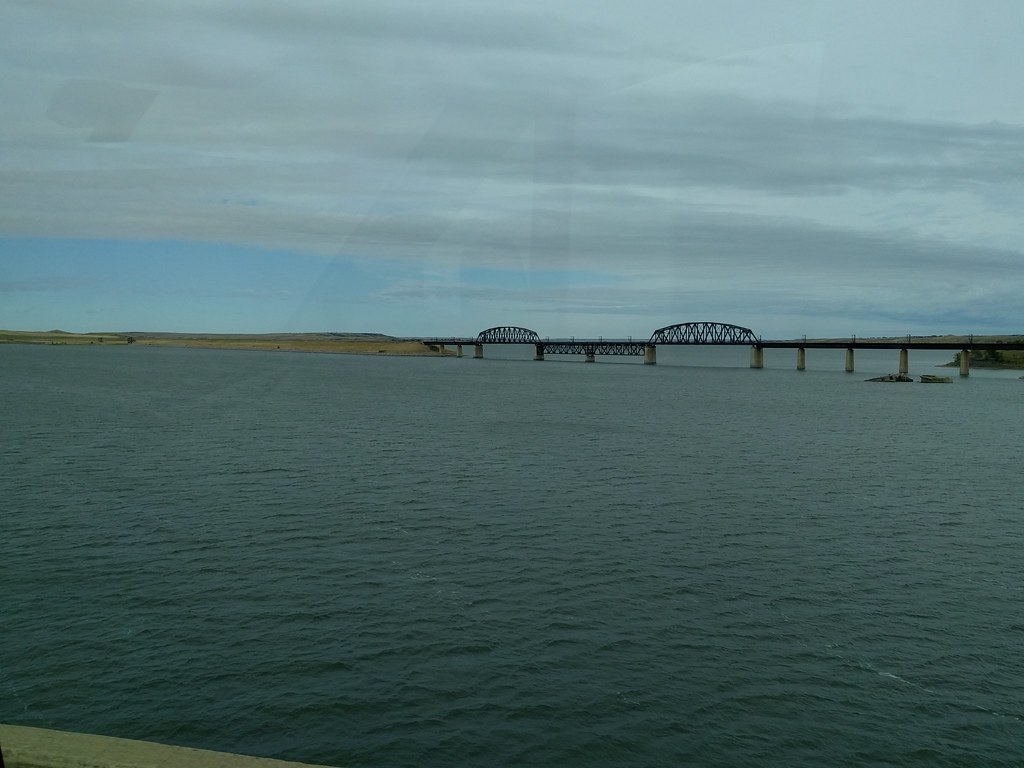
The Mobridge Train Observation Spot, located near the Missouri River Bridge in Mobridge, South Dakota, offers a scenic vantage point for train enthusiasts and nature lovers. Visitors can enjoy panoramic views of trains crossing the historic bridge, set against the backdrop of the picturesque Missouri River.
Photos
Sign in to upload photos
No Photos Yet
Be the first to share photos of this location!
Mobridge (Missouri River Bridge) – Mobridge, South Dakota, USA | Train Spotting Location
Trainspotting Experience
A typical visit starts with the low thrumming of EMD or GE power drifting over the water long before the consist comes into sight. The single-track span sits roughly 70 ft above normal river level, so wheel noise reverberates across the channel and over the floodplain. From public pull-offs near U.S. Highway 12 on the east approach, you can watch a train sweep out of the tree line, climb the short grade onto the steel girders, and accelerate to a steady 30–35 mph as it crosses the full half-mile length of the bridge. The view is wide open: no fencing, minimal vegetation, and very little vehicle traffic to compete with the soundscape. Expect horn echoes off the bluffs to the west, especially on calm mornings, and the satisfying metallic click-clack amplified by the water surface below. Trains average 6–8 minutes from first sight to last unit clearing the bridge, giving plenty of time for framing shots or just soaking in the moment.
Landscape, Setting & Local Atmosphere
Mobridge sits where glacial prairie meets the dam-backed waters of Lake Oahe. The eastern riverbank is a notch lower, bordered by cottonwoods and open grassland that slides gently to the shoreline. On the opposite side, 150-ft clay bluffs rise in stair-step layers, creating a natural amphitheater for rail noise and a striking two-tone backdrop—sage green grass above tawny sedimentary rock. Skies tend to be expansive and cloud-studded; sunsets often paint the bridge in gold and magenta. Summer days hover around 85 °F with steady southwesterly breezes, while winter can plunge below zero, frosting every truss and tie but rewarding hardy railfans with crystal-clear air and vapor bursts from locomotives.
Type & Frequency of Train Activity
The bridge carries BNSF Railway’s Mobridge Subdivision, a key east-west corridor that links grain elevators in the Dakotas to Pacific Northwest ports. Actual traffic fluctuates with harvest cycles and energy demand, but railfan counts consistently come in at 18–24 trains per 24-hour period. Expect:
• Grain unit trains (110–120 hoppers) headed for Tacoma or Kalama
• Powder River Basin coal drags moving northbound to Minnesota utilities
• Mixed manifests with farm machinery, tank cars, and center-beams
• A lighter but noticeable flow of domestic intermodal blocks, usually in evening slots
No Amtrak service runs here; the closest passenger activity is Empire Builder traffic far to the north on BNSF’s KO Subdivision.
Best Angles for Photos & What Railfans Enjoy Most
- East-bank riverfront pull-off: A gravel turnout below the Highway 12 embankment offers a full side profile at roughly 250 ft distance. Morning light is ideal as the sun rises behind you, illuminating the bridge face and reflecting off the water.
- Bluff overlook on the west bank: A public section of county road climbs 80 ft above track level, giving a three-quarter aerial view with the town of Mobridge and its grain elevator framed beyond the span. Late afternoon light silhouettes locomotives against the river.
- River-level shots: A short, marked footpath south of the bridge leads to riprap where you can capture dramatic underside perspectives with mirrored reflections—best on windless days.
Long lenses (200–400 mm) isolate locomotives against sky, while wide-angles (24–35 mm) emphasize the sheer length of 7,000-ft grain drags crawling across steel. Railfans appreciate how few foreground obstructions exist; even tripod setups stay clear of private property lines thanks to generous public right-of-way widths.
Historical or Cultural Relevance
The original Milwaukee Road crossing opened in 1907, linking Chicago to the Pacific Coast via its famed Pacific Extension. When construction of the Oahe Dam raised river levels in the 1950s, the railroad built the present concrete-pier and plate-girder structure in 1961, relocating the line several hundred feet south of the pioneer route. Remnants of the 1907 timber trestle footings are still visible at low water. Today’s bridge stands as one of the last visible chapters of the Milwaukee Road’s western ambitions, now folded into BNSF’s prairie network. Locally, trains supplied the cattle yards and grain terminals that grew Mobridge from a tent town to a regional trade hub; the city’s name itself is a contraction of “Missouri Bridge.”
What Makes This Spot Different
Unlike many Midwest railfanning sites hemmed in by trees or private farmland, Mobridge offers a 180-degree, river-level panorama where every axle thunder echoes and every consist is visible from lead unit to FRED. The interplay of wide water, high sky, and sheer structural steel produces images more commonly associated with mountain passes—yet accessibility remains as simple as parking off a U.S. highway. The absence of passenger traffic also means freight trains are often longer and heavier, providing that extended, cinematic crossing experience prized by hardcore railfans.
Localisation
Coordonnées :45.568482, -100.459220
Seasonal Information
For train observation at the Mobridge Train Observation Spot in South Dakota, spring and fall offer mild weather and scenic views with blooming flowers or colorful foliage. Summer provides long daylight hours, while winter offers picturesque snowy scenes. Check local schedules for any special train events.
Other Interesting Locations
Looking for more spots? Browse the complete list of train spotting locations.
Quick Information
Country
USA
Region / State / Province
South Dakota
City
Mobridge
Spot Type
Bridge
Best Times
Best hours to observe trains at Mobridge: weekdays during morning (7-9 AM) and evening (5-7 PM) peak times for higher train frequency.
